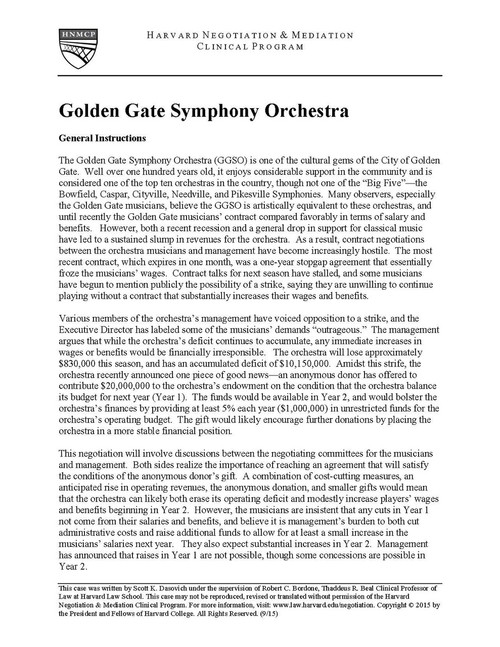Product Description
Abstract
The Golden Gate Symphony Orchestra (GGSO) is entering a contract negotiation between the orchestra musicians and management. The contract comes at a critical juncture for the orchestra—it has been operating at a deficit for several years, but a donor has offered a $20 million gift to the endowment conditioned on the orchestra balancing its budget in the upcoming negotiation for Years One and Two. Orchestra management and musicians have a history of hostile negotiations marred by strikes and lockouts that both sides desire to remedy.
“Golden Gate” provides a challenging opportunity for participants to engage in a complex negotiation involving multiple stages and multiple issues.
The case is designed as a three-on-three negotiation, though it could be run as a one-on-one exercise as well. Because of the complexity of the issues and background, participants should plan to invest time in preparation: at least 1-1.5 hours to read the General and Confidential Information, and an additional hour for the teams of three to meet on their own prior to the main negotiation. The negotiation between the teams should take place within a four-hour time block. The case offers a multitude of potential directions for an instructor’s debrief: the instructor could cover how the groups of three negotiated a process, roles, and their intra-team dynamic; how the teams of three negotiated together to arrive at a substantive resolution (or not); and the challenges of negotiating in a group.
This product includes:
- General instructions
- Confidential instructions for management;
- Confidential instructions for musicians;
- Complete Teacher's Package with all files listed above, plus instructions for facilitating the Golden Gate Symphony Orchestra negotiation and review.
Learning Objectives
This case allows for the introduction and review of several intermediate and advanced negotiation concepts:
- To identify interests and create options in a complex multiparty negotiation;
- To understand tensions between creating and claiming value in a “scored” negotiation;
- To illustrate the importance of setting up and implementing a multiparty negotiation process;
- To highlight multiparty relationship, coalition, and spoiler dynamics; and
- To understand how to break impasses in multiparty negotiations.
Subjects Covered
Negotiation Simulation; Multiparty Negotiation Process and Strategy; Integrative and Interest-Based Negotiation.
Setting
Geographic: United States
Industry: Performing arts, Music
Hard Copy
For hard copies, please contact the HLS Case Studies Program at hlscasestudies@law.harvard.edu or +1-617-496-1316. When ordering, please let us know how many copies of confidential materials that you will need.
Accessibility
To obtain accessible versions of our products for use by those with disabilities, please contact the HLS Case Studies Program at hlscasestudies@law.harvard.edu or +1-617-496-1316.
Educator Materials
Watermarked review copies of this product are available free of charge to educators and staff of degree-granting institutions. Please create an account or sign in to gain access to these materials.
Note: It can take up to three business days after you create an account to verify educator access. Verification will be confirmed via email.
Copyright Information
Please note that each purchase of this product entitles the purchaser to one download and use. If you need multiple copies, please purchase the number of copies you need. For more information, see Copying Your Case Study.



